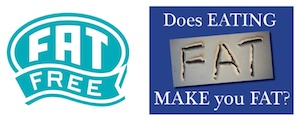 BY EMMET RUSHE: The low fat craze is something that was a bit of a slow starter.
BY EMMET RUSHE: The low fat craze is something that was a bit of a slow starter.
It originally began in the 70’s from studies on cholesterol and heart health in which they mistakenly proved a cause and correlation between dietary fat and heart attacks.
It wasn’t until March 1984 when ‘Time Magazine’ ran a cover entitled ‘Cholesterol and now the bad news’ , that the public caught onto the notion that fat was bad for your health.
The sub headline of the article was ‘Cholesterol is proved deadly, and our diet may never be the same’.
I wonder if the author of the article knew at the time how right that paragraph would be.
For the next two decades, the low fat craze took off like a steam train on overdrive.
Every shop and supermarket you went into was selling some sort of fat-free produce.
Diet companies were started with their whole mantra based on low fat eating.
The premise for low fat diets seemed like a simple one; eat less fat and you will lose fat; what could be simpler than that?
However, when we look at the statistics that came out of the 80’s regarding the low fat diet we see a different story altogether.
‘During the fat-free era, fat consumption decreased by 33 percent and obesity increased by 11 percent’.
If we look at the low fat and fat-free diet era as a whole, what we have actually ended up with is an obesity epidemic.
When it comes to diet and nutrition, fat is a nutrient that has been stigmatized as something that you should avoid.
For years you have been told that if you want to lose weight, you have to eat low-fat foods or avoid fat all together.
This may seem like a good idea, but if you eliminate fat from your diet you will deprive your body of essential nutrients that your body needs to be healthy.
Instead of eliminating fat from your diet, it is better to eliminate certain types of fat and include others.
Trans-fats are found in food like chips, margarine, crackers, biscuits, snack foods, fast foods and processed foods.
Trans-fats are worse for cholesterol levels than saturated fats because trans-fats raise bad cholesterol and lower good cholesterol at the same time.
The way to spot them on products is to look out for partially hydrogenated fats and hydrogenated fats on the ingredients list.
The truth of the matter is that eating fat can actually help you to burn stored body fat.
Nutritionist Alan Aragon M.S says:
“Research shows that the fat in meat and milk (a saturated fat known as stearic acid) is actually good for you’
Also, omega-3 fatty acids (which are commonly found in fish) can do everything from decrease blood pressure and inflammation, to improve bone health and help you lose weight.
In contrast, trans fats, which are industrially produced and lurk under names like “partially hydrogenated vegetable oil,” will wreak havoc on your body.
So what types of fat can we eat and are actually good for our health?
(It is important to remember that this will work best if your diet is made up of whole foods rather than processed foods.)
Foods like;
Oily fish or omega 3 supplements (2-4 times per week), extra virgin olive oil, flax seeds, nuts (not peanuts), nut butters (almond, cashew), seeds, avocados, coconut oil, steak, minced steak, milk, cheese, Greek yoghurt, cottage cheese.
These are a few choice sources of fat that you can include in your diet that, taken in moderation, can help improve a number of health issues in the body and may also help lose some stored body fat.
The next issue of ‘Time Magazine’ is due out on the 23rd of June.
On the cover is a picture of a spiral of butter and the heading is ‘Ending the War on Fat’
#TrainSmart
 If you have any question on this article or for getting a tailored program to help you reach your weight loss/weight gain goals, please contact me through the link below.
If you have any question on this article or for getting a tailored program to help you reach your weight loss/weight gain goals, please contact me through the link below.
https://www.facebook.com/pages/Rushe-Personal-Training-and-Performance/120518884715118
* Emmet is the owner and operator of Rushe Personal Training and Performance
Tags:







